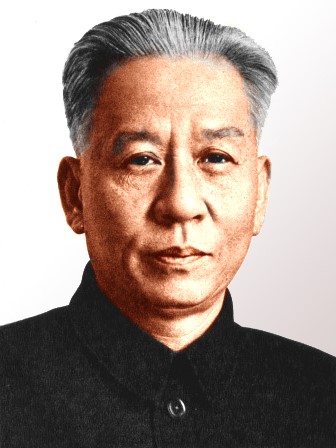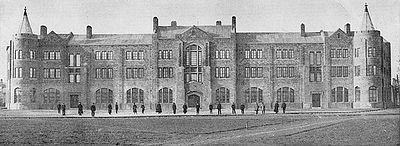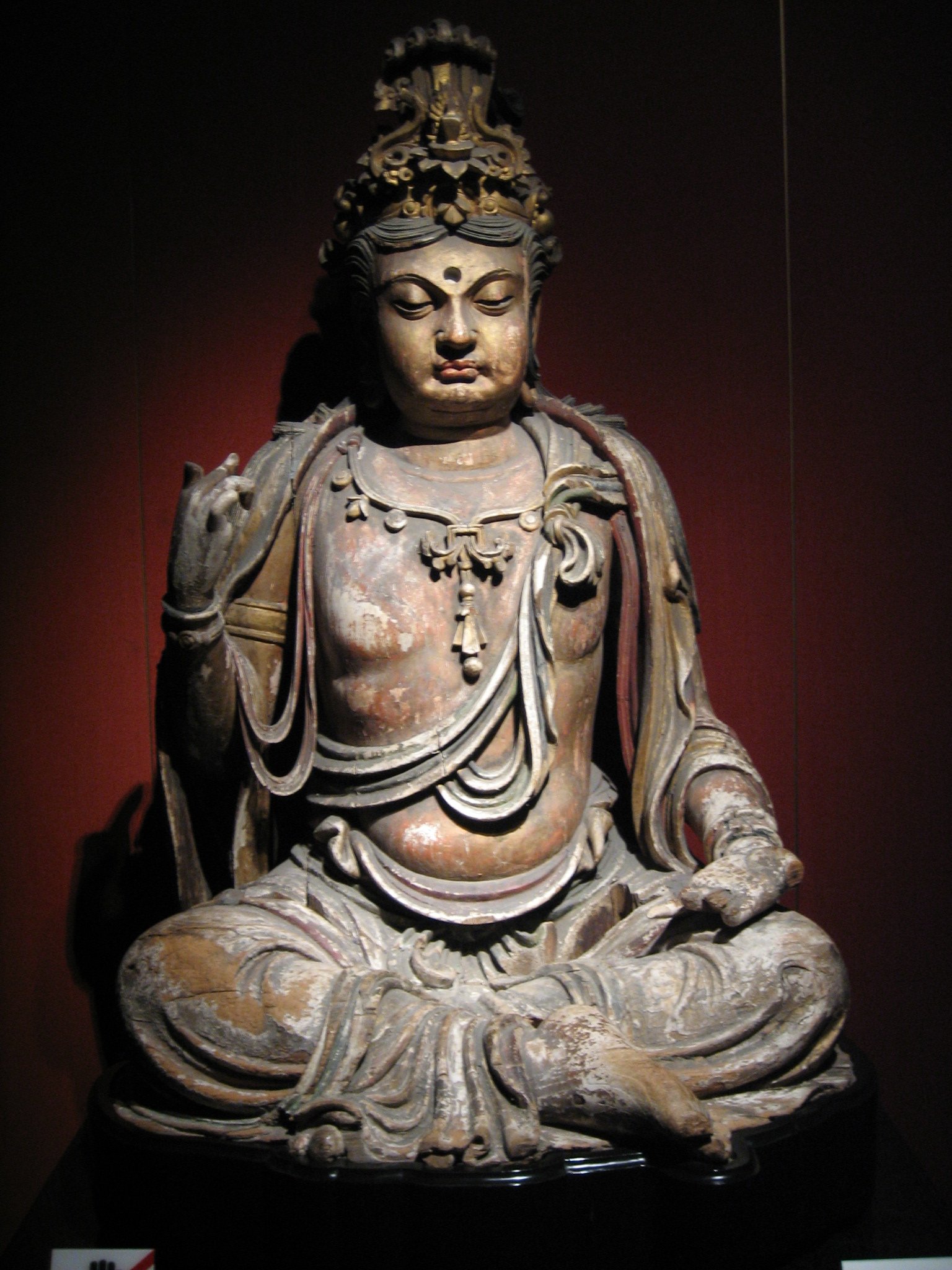|
Peng Zhen
Peng Zhen (pronounced ; October 12, 1902 – April 26, 1997) was a leading member of the Chinese Communist Party. He led the party organization in Beijing following the victory of the Communists in the Chinese Civil War in 1949, but was purged during the Cultural Revolution for opposing Mao's views on the role of literature in relation to the state. He was rehabilitated under Deng Xiaoping in 1982 along with other 'wrongly accused' officials, and became the inaugural head of the Central Political and Legal Affairs Commission. Biography Born in Houma, Shanxi province, Peng was originally named Fu Maogong (傅懋恭). He joined the Chinese Communist Party (CCP) in 1923 as a founding member of the Shanxi Province CCP. Arrested in 1929, he continued underground political activities while imprisoned. He was released from prison in 1935 and began organizing a resistance movement against the invading Japanese forces. Around the same time, he was appointed the Organization D ... [...More Info...] [...Related Items...] OR: [Wikipedia] [Google] [Baidu] |
Chairman Of The Standing Committee Of The National People's Congress
The chairman of the Standing Committee of the National People's Congress is the presiding officer of the Standing Committee of the National People's Congress (NPCSC), which is the permanent body of the National People's Congress, highest organ of state power and top legislative body in the People's Republic of China (PRC). The chairman presides over the work of the NPCSC and convenes and presides over its meetings. The chairman is assisted by the vice chairpersons and secretary-general of the NPCSC. A vice chairperson may be delegated to exercise some of the chairman's powers by the chairman. In the case that the chairman becomes incapacitated, NPCSC temporarily elects one of the vice chairpersons until the chairman is able to resume their work or a new chairman is elected by the NPC. The position holds reserve constitutional powers under the 1982 revision of the Constitution of the People's Republic of China. As stipulated in Article 84 of the Constitution, should both the p ... [...More Info...] [...Related Items...] OR: [Wikipedia] [Google] [Baidu] |
Peng (surname)
Peng ( Chinese: 彭; pinyin: Péng; alternative forms of romanization include Pang and Phang (Cantonese, Hakka), Pangestu or Pangestoe ( Indonesian), and Bành ( Vietnamese)) is a common Chinese family name, ranking 35th most common in 2006. It is the 47th name on the '' Hundred Family Surnames'' poem. Etymology The character (彭) is composed of (''zhǔ'' meaning "drum") and a pictograph (''shān'' representing "beats"). More commonly used as a surname, this character is also an adjective, meaning "big". Origin The surname Peng (彭) is traced to the legend of Peng Zu, God of Longevity, who legend tells lived 800 years. During the Shang dynasty, Jian Keng, a descendant of Zhuanxu, was granted the feudal territory Dapeng (Great Peng), and later adopted the name, Peng Zu. Distribution In 2019 it was the 31st most common surname in Mainland China. Of the top 30 cities in China, 彭 ranked 9th most common in the city of Changsha."https://www.douban.com/group/topic/238035 ... [...More Info...] [...Related Items...] OR: [Wikipedia] [Google] [Baidu] |
Central Committee Of The Chinese Communist Party
The Central Committee of the Chinese Communist Party, officially the Central Committee of the Communist Party of China, is a political body that comprises the top leaders of the Chinese Communist Party (CCP). It is currently composed of 205 full members and 171 alternate members (see list). Members are nominally elected once every five years by the National Congress of the Chinese Communist Party. In practice, the selection process is done privately, usually through consultation of the CCP's Politburo and its corresponding Standing Committee. The Central Committee is, formally, the "party's highest organ of authority" when the National Congress is not in a plenary session. According to the CCP's constitution, the Central Committee is vested with the power to elect the General Secretary and the members of the Politburo and its Standing Committee, as well as the Central Military Commission. It endorses the composition of the Secretariat and the Central Commission for Di ... [...More Info...] [...Related Items...] OR: [Wikipedia] [Google] [Baidu] |
Du Yuming
Du Yuming (; 28 November 1904 – 7 May 1981), was a Kuomintang field commander. He was a graduate of the first class of Whampoa Academy, took part in Chiang's Northern Expedition, and was active in southern China and in the Burma theatre of the Sino-Japanese War. After the Japanese surrendered in 1945, he was an important commander in the Chinese Civil War. From 1945-47 Du commanded Nationalist forces in Northeast China and won several important battles against Communist forces there, including defeating the Communist general Lin Biao twice at Siping. Despite his successes, Chiang relieved him from command in 1947, after which Communist forces quickly took control of the region. Du was captured later in the civil war and spent a decade as a prisoner of war. He was released in 1959, and given a position in the Communist government. Biography Early military career A trusted protégé of Chiang Kai-shek, Du was a graduate of the first cadet class at the Whampoa Military A ... [...More Info...] [...Related Items...] OR: [Wikipedia] [Google] [Baidu] |
Harbin
Harbin (; mnc, , v=Halbin; ) is a sub-provincial city and the provincial capital and the largest city of Heilongjiang province, People's Republic of China, as well as the second largest city by urban population after Shenyang and largest city by metropolitan population (urban and rural together) in Northeast China. Harbin has direct jurisdiction over nine metropolitan districts, two county-level cities and seven counties, and is the eighth most populous Chinese city according to the 2020 census. The built-up area of Harbin (which consists of all districts except Shuangcheng and Acheng) had 5,841,929 inhabitants, while the total metropolitan population was up to 10,009,854, making it one of the 50 largest urban areas in the world. Harbin, whose name was originally a Manchu word meaning "a place for drying fishing nets", grew from a small rural settlement on the Songhua River to become one of the largest cities in Northeast China. Founded in 1898 with the coming of the ... [...More Info...] [...Related Items...] OR: [Wikipedia] [Google] [Baidu] |
Changchun
Changchun (, ; ), also romanized as Ch'angch'un, is the capital and largest city of Jilin Province, People's Republic of China. Lying in the center of the Songliao Plain, Changchun is administered as a , comprising 7 districts, 1 county and 3 county-level cities. According to the 2020 census of China, Changchun had a total population of 9,066,906 under its jurisdiction. The city's metro area, comprising 5 districts and 1 development area, had a population of 5,019,477 in 2020, as the Shuangyang and Jiutai districts are not urbanized yet. It is one of the biggest cities in Northeast China, along with Shenyang, Dalian and Harbin. The name of the city means "long spring" in Chinese. Between 1932 and 1945, Changchun was renamed Xinjing () or Hsinking by the Kwantung Army as it became the capital of the Imperial Japanese puppet state of Manchukuo, occupying modern Northeast China. After the foundation of the People's Republic of China in 1949, Changchun was established as ... [...More Info...] [...Related Items...] OR: [Wikipedia] [Google] [Baidu] |
Shenyang
Shenyang (, ; ; Mandarin pronunciation: ), formerly known as Fengtian () or by its Manchu name Mukden, is a major Chinese sub-provincial city and the provincial capital of Liaoning province. Located in central-north Liaoning, it is the province's most populous city, with a total population of 9,070,093 inhabitants as of the 2020 census. Among the resident population of the city, the male population is 4,521,021, accounting for 49.85%; the female population is 4,549,072, accounting for 50.15%. The sex ratio of the total population (with women as 100, the ratio of men to women) dropped from 102.10 in the sixth national census in 2010 to 99.38. Its built-up (or metro) area encompassing 8 Shenyang urban districts and the 4 Fushun urban districts, was home to 8,192,848 inhabitants in 2020. It is also the largest city in Northeast China by urban population, with 7.49 million people (2020 census). Shenyang is also the central city of one of the major megalopolises in China, the Gr ... [...More Info...] [...Related Items...] OR: [Wikipedia] [Google] [Baidu] |
Lin Biao
) , serviceyears = 1925–1971 , branch = People's Liberation Army , rank = Marshal of the People's Republic of China Lieutenant general of the National Revolutionary Army, Republic of China , commands = 1st Corps 1st Red Army Corps, Chinese Red Army 115 Division, 8th Route Army People's Liberation Army Lin Biao ( Chinese: 林彪; 5 December 1907 – 13 September 1971) was a Chinese politician and Marshal of the People's Republic of China who was pivotal in the Communist victory during the Chinese Civil War, especially in Northeast China from 1946 to 1949. Lin was the general who commanded the decisive Liaoshen and Pingjin Campaigns, in which he co-led the Manchurian Field Army to victory and led the People's Liberation Army into Beijing. He crossed the Yangtze River in 1949, decisively defeated the Kuomintang and took control of the coastal provinces in Southeast China. He ranked third among the Ten Marshals. Zhu ... [...More Info...] [...Related Items...] OR: [Wikipedia] [Google] [Baidu] |
Northeast China
Northeast China or Northeastern China () is a geographical region of China, which is often referred to as "Manchuria" or "Inner Manchuria" by surrounding countries and the West. It usually corresponds specifically to the three provinces east of the Greater Khingan Range, namely Liaoning, Jilin, and Heilongjiang, but historically is meant to also encompass the four easternmost prefectures of Inner Mongolia west of the Greater Khingan. The heartland of the region is the Northeast China Plain, the largest plain in China, with an area over . It is separated from Russian Far East to the north by the Amur, Argun, and Ussuri rivers; from Korea to the south by the Yalu and Tumen Rivers; and from Inner Mongolia to the west by the Greater Khingan and parts of the Xiliao River. Due to the shrinking of its once-powerful industrial sector and decline of its economic growth and population, the region is often referred to as China's Rust Belt. As a result, a campaign named Northeas ... [...More Info...] [...Related Items...] OR: [Wikipedia] [Google] [Baidu] |
Mao Zedong
Mao Zedong pronounced ; also Romanization of Chinese, romanised traditionally as Mao Tse-tung. (26 December 1893 – 9 September 1976), also known as Chairman Mao, was a Chinese communist revolutionary who was the List of national founders, founder of the People's Republic of China (PRC), which he led as the chairman of the Chinese Communist Party from the Establishment of the People's Republic of China, establishment of the PRC in 1949 until Death and state funeral of Mao Zedong, his death in 1976. Ideologically a Marxist–Leninist, his theories, military strategies, and political policies are collectively known as Maoism. Mao was the son of a prosperous peasant in Shaoshan, Hunan. He supported Chinese nationalism and had an anti-imperialist outlook early in his life, and was particularly influenced by the events of the Xinhai Revolution of 1911 and May Fourth Movement of 1919. He later adopted Marxism–Leninism while working at Peking University as a librarian and bec ... [...More Info...] [...Related Items...] OR: [Wikipedia] [Google] [Baidu] |
National Congress Of The Chinese Communist Party
The National Congress of the Chinese Communist Party (; literally: Chinese Communist Party National Representatives Congress) is a party congress that is held every five years. The National Congress is theoretically the highest body within the Chinese Communist Party (CCP). Since 1987 the National Congress has been held in the months of October or November. The venue for the event, beginning in 1956, is the Great Hall of the People in Beijing. The Congress is the public venue for top-level leadership changes in the CCP and the formal event for changes to the Party's Constitution. In the past two decades the National Congress of the CCP has been pivotal at least as a symbolic part of leadership changes, and therefore has gained international media attention. The Congress formally approves the membership of the Central Committee, a body composed of the top decision-makers in the party, state, and society. In practice, however, only slightly more candidates than open seats are ... [...More Info...] [...Related Items...] OR: [Wikipedia] [Google] [Baidu] |
Central Party School Of The Chinese Communist Party
The Central Party School of the Chinese Communist Party (), commonly known as the Central Party School (), located in Beijing, is the higher education institution which trains Chinese Communist Party (CCP) cadres. As of 2012, it has around 1,600 students. The current president is Chen Xi, a member of the CCP Politburo. The location of the school is now in Haidian district, Beijing close to the Old Summer Palace and Summer Palace. History The Party School was established as the CCP Central Committee's Marx School of Communism () in Ruijin, Jiangxi in 1933. It folded when the Red Army left on the Long March and was revived again once the CCP leadership had arrived and settled in Shaanxi, northwest China, in the winter of 1936. It was then renamed the Central Party School. The School was suspended in 1947 when the CCP retreated from Yan'an. It was re-opened in 1948 in a village in Pingshan County, Hebei province, before being moved to Beijing after the CCP captured the city in ... [...More Info...] [...Related Items...] OR: [Wikipedia] [Google] [Baidu] |


.jpg)



